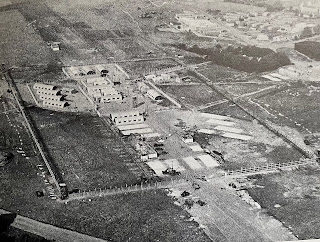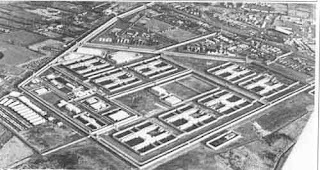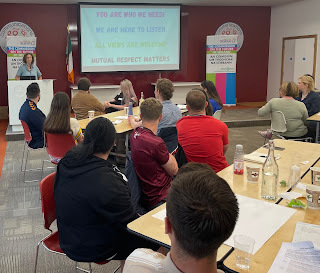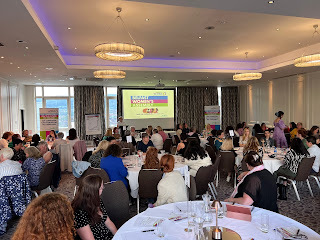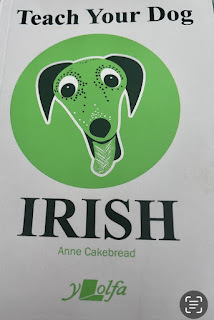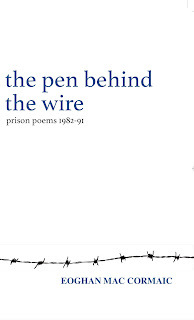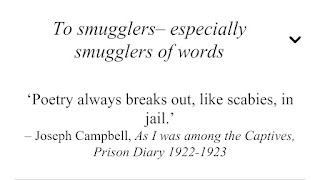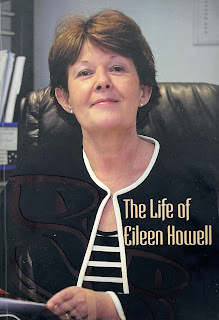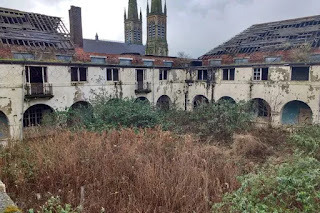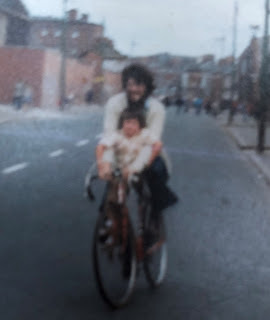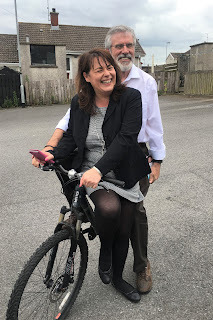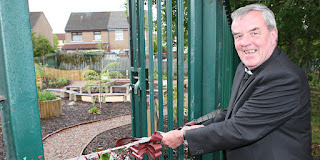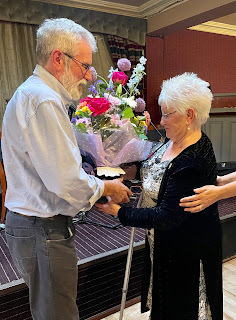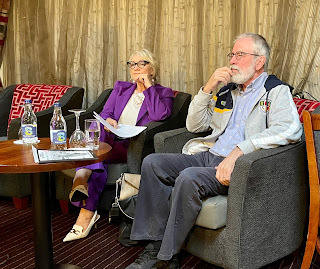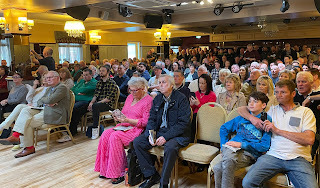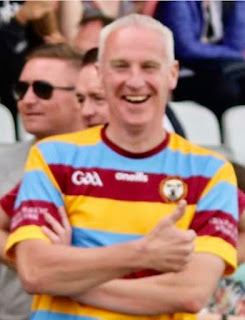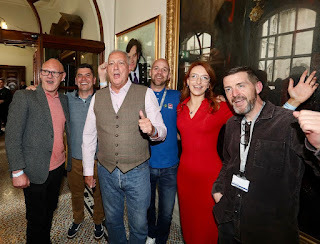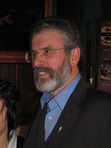Gerry Adams's Blog, page 11
August 10, 2023
“I stand with the people of Ireland” - Jessie Jackson: The partitionist mindset of RTE: Fly Me To The Moon.:
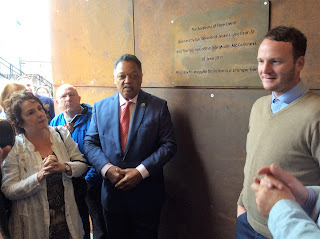
“I stand with the people of Ireland” - JessieJackson
Reverend Jesse Jackson has been a long-standingfriend of Ireland and an advocate for equality and peace. He has visited heremany times and I have been fortunate to have also had the opportunity to meethim in the USA. During a visit to the North in 2011 Rev. Jackson said:“The pattern of communities struggling for freedom, justice and democracy isessentially the same … Where there is no justice, there can be no peace. As Dr.King often reminded us, peace is not the absence of noise but the presence ofjustice.”
On his last visit in June 2017 Rev. Jackson openedthe newly rebuilt Museum of Free Derry along with Fiachra McGuinness and hismother Bernie. He also visited Martin’s graveside. Four months later Rev.Jackson was diagnosed with Parkinson’s Disease.
As well as telling the story of Bloody Sunday themuseum is dedicated to the civil rights movement which drew inspirationfrom the African-American civil rights struggle in the USA. Jesse Jackson was partof the leadership of that movement and was with Martin Luther King when he wasassassinated in April 1968. He is an iconic figure for all of those across theworld who struggle for civil rights and social and economic justice.
Last week Rev Jackson, now aged 81, announced thathe was stepping down as head of the Chicago-based Rainbow PUSH Coalition whichhe founded. Despite this move he and the Rainbow Coalition have made it clearthat his commitment to civil rights is unwavering, and he will now focus on“teaching ministers how to fight for social justice and continue the freedommovement.”
In 2020 Rev Jackson sent a video message tothe annual New York-New Belfast conference. He told his Irish and Americanaudience: ““We're not going backwards; we're not going to give up. There's asense of spirituality in our marches.
It's a healing time, it's hope time. I stand withpeople of Ireland and Irish Americans and Irish in Ireland. Fred Douglasswas there, and I've been there. I look forward to coming to Ireland again.Please let me come back. I love you guys very much.”
Well we love him to and would very much hope thathe would come back for a visit. Until then we extend our solidarity to a uniqueand inspirational leader and to his family.
PS
Next week a statue of Frederick Douglass is beingunveiled in Belfast. More of that then.
The partitionist mindset of RTE
The recent controversies surrounding RTE –problematic payments, a lack of transparency, questionable management, deeplyflawed oversight, the blocking of GAA matches to the North, the GAAGO saga andthe geo-blocking of the Women’s FIFA World Cup into the North– and much more,will have surprised few who have watched the unacceptable behaviour ofgovernments and RTE Executives and management over many decades.
Many will remember the failure of RTE over theyears to hold successive governments to account, to expose the corruptionwithin the political system or to challenge the golden circles and the elites.
In addition, the partitionist mindset withinsections of the RTE big shots that has dictated strategy and policy, especiallysince 1969, led some in that institution to think it was ok to produce a map ofIreland that disappeared the North into the Atlantic and created a newcoastline running from Donegal to Louth. Worse their reflection of life in thispart of the island during the decades of conflict frequently bordered on theshameful and misrepresented the lived experience of nationalists andrepublicans living under military occupation.
Not all RTE staff follow that agenda. I have metmany fine, fair minded and courageous journalists and others who do their bestto inform and educate listeners and viewers and I love some RTE programmesespecially radio programmes.
ButSection 31, imposed by a Fianna Fáil government in 1971 was ruthlessly applied,especially after the Labour Minister Conor Cruise O’Brien included Sinn Fein in1976 among the banned organisations. Songs of a national character – some olderthan the state - were banned from the airwaves. Sinn Fein activists who werewitnesses to non-political events were banned.
Overthe years I have had many a run in with the powers that be in RTE.
Onone occasion in 1993 I published a book of short stories – The Street andother stories. My publisher, Steve MacDonogh of Brandon decided to go for ashort twenty-second radio advertisement on RTE. The advert was as follows “Thisis Gerry Adams speaking. My new book is called The Street and otherstories and it’s on sale in good book shops in the 32 counties. Mostof the stories are about ordinary people and everyday events and there’s a fairbit of craic in them also. That’s The Street and other stories andthis is Gerry Adams. I think you might enjoy it. Slán.’
RTErefused to carry the ad and Steve took the case to the Dublin High Court. Theformer Labour Party Minister, Conor Cruise O’Brien, testified in defence ofbanning the advertisement. He claimed that my short stories were thinlydisguised propaganda for the IRA. In his submission O’Brien argued that whilethe advert was not political the opening words would offend and corrupt theIrish public. “I have in mind” he said, “the opening words ‘This is GerryAdams speaking.’” The court found in favour of RTE and Section 31.
Inthree years – 2026 – RTE will celebrate 100 years as a public servicebroadcaster. The new Authority and management need to demonstrate that they arein fact and in action a national broadcaster - a real public servicebroadcaster for all the people of the island of Ireland.
Fly Me To The Moon.
I am a longtime fan ofTony Bennett. News of his death atthe fine age of ninety six bringsan end to an amazing life and a wonderful singing career lasting oversixty years. In more recent times this column reviewed an album he didwith Lady GaGa. Cheek to Cheek is anenvigorating stroll through some old favourites likeAnything Goes alongside more modern melodies. Tony Bennett wasthen 94 years of age. He was also suffering fromAltzeimers. You wouldn’tknow that from listening to him singing on that album.
Tony Bennett is celebrated forhis decades of singing hit songs. But he has also been alife long activist, a dedicated pacifist and an advocate for socialjustice and a cleaner environment. He marched with Martin Luther King in theSelma to Montgomery Civil Rights demonstration. He is also anacclaimed painter whose work has raisedmillions for good causes.But it is his singing that most of us enjoy. I have had the good luckto hear him sing live a few times. These wereduring conferences organised by TheClinton Global Initiative(CGI) in New York. He sang a few songs to round offthe evenings.
I recalled one suchevent in one of these columns once before. No harm to do so again. It was inCarnegie Hall. It has long been my habit, as RG will testify, toslip out off gatherings as quickly as possible. I used to slegg MartinMcGuinness for the slowness of his exiting from events. ‘Getting youout of there is like getting a drunk out off a public house’ Iwould berate him. RG is even worse thanthat. Me? Once the business is done I vamoose.Lots of times by side doors or back entrances. So itwas in Carnegie Hall. The main exits were blocked by slow moving CGIattendees, all of us bouyed up by Tony Bennett’s closing performance.So as is my wont I exited stage left, out a sidedoor,crooning ‘I left my heart in Ballymurphy’ quietly to myself.
Theside door opened up onto West 56th Street. From there itwas only a matter of yards to 7th Avenue and the Sheraton Hotel– where we were staying. I was so happyat my good luck - at other times I have succesfully withdrawn from agig only to be lost in a maze of corridors or back entries.
Guess what?
Standing onhis own, in the corridor leading to outside, was Tony Bennett. Iopened the door for him and he walked out as a limo easedby to pick him up. As he passed he saluted me. AndRG.
‘Goodnight Mr Adams’ he said.
‘Good night Mr Bennett’ Ireplied.
Starstruck.
Ní bheidh a leithid arisann.
July 24, 2023
Slán Irish Voice: Every Brilliant Thing: War Crimes in Jenin
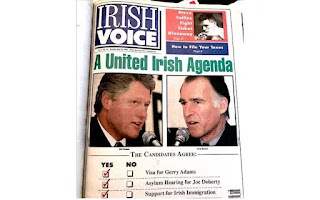
Slán Irish Voice
Two weeks ago Niall O’Dowd, founder of the IrishAmerican newspaper The Irish Voice announced that it was to close after 36years. The New York based Irish Voice and the Irish Echo were the principlesources of news for decades of Irish Americans and new Irish immigrants movingto the USA. Now the Irish Voice is gone. But a far sighted Niall O’Dowdrealised some years ago the direction of travel for newspapers competingagainst the huge growth in online media services and founded the online IrishCentral. Today IrishCentral.com gets over two million visitors monthly.
I first met Niall in Belfast in1983. He was interviewing me for an Irish newspaper in San Francisco which hethen edited. I had been elected as the MP for west Belfast and Niall wasinterested in the political developments taking place in the aftermath of the1981 hunger strike. Sinn Féin had won five seats to the Assembly in 1982 andreceived over 100,000 votes in the June 1983 Westminster general election. Ihad only recently been unbanned from travelling to Britain – it was re-imposedsome years later – and Section 31 in the South, which prevented Sinn Féinrepresentatives from appearing on radio or television, was deeply embedded inthe political and media establishment. It still is in some quarters,particularly the old guard at RTE.
Later when Sinn Féin establishedour peace strategy and my meetings with John Hume became public Niall was amongthe first to recognise their significance. He played a central role in creatingthe opportunity for Presidential hopeful Bill Clinton to state publicly hissupport for a visa for me and for a special envoy to be appointed and he waskey to the engagement with the group of Irish Americans – the Connolly HouseGroup – who helped create the conditions for the IRA cessation in 1994.
A measure of the importance of therole of Niall O’Dowd and of the Connolly House group was recalled later byConor O’Cleary, the Irish Times journalist based at that time in the USA. Heprovides a sense of the secret machinations that were part of the process:“One foggy summer evening in Dublin, around the middle of August 1994, aman stood waiting outside the Irish Independent office in Middle Abbey Street.Out of the mist, an attractive woman appeared and approached him. She asked,"Do you think Dublin will win on Sunday?" Recognising the code words,he handed her a document and they both walked off in different directions.
The woman was from Sinn Fein, andthe document she was given was one drafted by Niall O'Dowd … In the documentthe Irish-American "peacemakers" committed themselves to a campaignto achieve certain goals if an unarmed strategy was pursued by the republicanmovement. The list of attainable goals included: unrestricted access to the USfor Gerry Adams and other Sinn Fein members; parity of treatment with otherNorthern Ireland leaders in Washington; the opening of a nationalist office inWashington; US government support for the peace process with the aim of gettingWashington to act as a guarantor of any agreements in Northern Ireland; and thepromotion of Irish-American business and investment in the North of Ireland.”
As part of the follow-up the IrishAmerican group returned to Ireland on 25 August. The group included NiallO'Dowd, Bruce Morrison, Bill Flynn, Chuck Feeney, Joe Jamison and Bill Lenihan.They were a crucial part in creating the right atmosphere for the IRA cessationthat was announced on 31 August 1994.
My personal connection with theIrish Voice began in 1993 when I suggested to Niall that I write a column forthe Voice. He promptly agreed. It became an important means by which the SinnFéin analysis and political initiatives could be explained to Irish America.The weekly articles included comment on President Mary Robinson’s visit to westBelfast and the brouhaha that was created around us shaking hands; thecraziness of my 48 hour visa to New York; the IRA cessation; the joint meetingwith Albert Reynolds and John Hume; my regular visits to the USA; the visit byPresident Clinton to Belfast and the many ups and downs of the peaceprocess. The columns and the two books that were published from them – AnIrish Voice; The Quest for Peace and An Irish Journal – are a diary of thosedays.
The articles were not all serious.Like this column they meandered all over the place – but always trying toprovide the reader with an insight into the political events of the time.
But one thing is clear throughoutit all and that is the power and the solidarity of Irish America with peace in Irelandand with the aim of Irish Unity. Niall O’Dowd made this latter objectiveabsolutely clear in his first editorial written in November 1987.
He made it clear again in his finaleditorial. He recalled that first issue; “We stated right away that a unitedIreland was the only long term solution to the failed partition of Ireland in1922 and our stance has not changed. In fact, there are very few impartialobservers who would quibble with the notion that in the intervening 36 years,prospects have never looked brighter than now for Ireland to finally unite.”
Niall O’Dowd and Voice editorDebbie McGoldrick built a crusading paper. “We are indeed an activist paper; wedon’t believe in journalism that uses phrases like, ‘On the one hand and theother.’ Have an opinion and defend it.”
And for almost four decades that’swhat the Irish Voice did.
So, go raibh maith agaibh to Niall,and Debbie and all of the staff of the Irish Voice for your powerfulcontribution to Irish America and the USA and to the Irish peace process andIreland. And thanks also for your support and forbearance through what wereoften difficult and challenging times. Adh mór. See you soon
Every Brilliant Thing
Listening, asI usually do on Sunday mornings, to Sunday with Miriam on RTE Radio afterSunday Miscellany I really enjoyed Altan’s tunes and Mairéad Ní Mhaonaigh’scraic. I was also very taken by the preview of Every Brilliant Thing which isbeing staged at The Galway Arts Festival.
TheatreDirector Andrew Flynn gave us an insight into this play by Duncan Macmillan.Essentially this is about a young man who starts, at the age of seven, tocompile a list of those things which make his life worth living. This is whilehe is battling with the challenges of the different stages of his life,including his mother’s attempt at suicide.
Andrew Flynnthen went on to invite all of us to compile our own list of Every BrilliantThing in our lives. I think this is a very good idea. If you agree make outyour own list of the Ten Brilliant Things in your life. You can also email yourlist to everybrilliantthinggalway@gmail.com
You can dothis anonamionusly. Here’s my list.
Family.
Friends.
GoodHealth.
Peace.
Nature.
Books.
Music.
Dogs.
The Gaeldom.
Féile AnPhobail.
WarCrimes in Jenin
TheIsraeli Government’s assault on Jenin, the Palestinian refugee camp, in theoccupied west Bank left 12 people dead and scores more injured. Using bombs,Apache helicopters, drones, bulldozers and hundreds of troops Israel’sapartheid regime imposed a reign of terror on the 14,000 people who live inJenin. More than 3,000 civilians were displaced from their homes.
Humanrights organisations have described the attack as a war crime with Israeliforces deliberately attacking civilians and medical personnel. The UN specialrapporteur Francesca Albanese said that the Israeli actions “amount toegregious violations of international law and standards on the use of force …”
Shamefullythe international community refuses to challenge Israel in its abhorrenttreatment of the Palestinian people. Some are going out of their way to defendIsrael. Not surprisingly the British government is to the fore in this.Recently it introduced new legislation – the EconomicActivity of Public Bodies (Overseas Matters) Bill.
Thestated objective of this legislation is “prevent public bodies from beinginfluenced by political or moral disapproval of foreign states when takingcertain economic decisions …". In other words the British government isoutlawing public bodies, including local authorities, pension funds anduniversities, from boycotting, refusing to invest in, or disinvesting from “(a)Israel, (b) the Occupied Palestinian Territories, or (c) the Occupied GolanHeights." No other state is mentioned in the legislation.
If you want to support the Palestinian people oneway is to endorse the Boycott, Divestment, Sanctions (BDS) movement in itswork to “end international support for Israel's oppression of Palestinians andpressure Israel to comply with international law.”
July 13, 2023
Cage 11 and The Twelfth
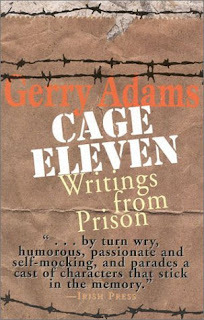
Cage 11 and The Twelfth
This is an article I wrote in February 1977 while Iwas Cage Eleven in Long Kesh. Here it is again for the season that’s in it. It’salso contained in Cage Eleven, published by Brandon Books.
How it started - Long Kesh 1971
The Twelfth
We were seated in our usual spot beside the showerhut. Cedric had successfully killed another conversation: all afternoon he hadbeen spewing forth useless pieces of information, contradicting and takingissue with everything anyone said. When he gets contrary like that we usuallykeep quiet and wait for him to go away. He refused to leave, so we sat togetherin silence.
Outside on the Blaris Cemetery Road an Orangemanwas beating his brains out on a Lambeg drum. Egbert was moved to break up ourdummies’ meeting.
“Did youse ever hear Seamus Heaney’s poem aboutOrange drums?”
Faced with the eloquence of our silence he clearedhis throat.
“Listen to this.”
“The Lambeg balloons at his belly, weighs
Him back on his haunches, lodging thunder
Grossly there between his chin and his knees.
He is raised up by what he buckles under.
Each arm extended by a seasoned rod,
He parades behind it. And though the drummers
Are granted passage through the nodding crowd,
It is the drums preside, like giant tumours.
To every cocked ear, expert in its greed,
His battered signature subscribes ‘No Pope’.
The goatskin’s sometimes plastered with his blood.
The air is pounding like a stethoscope.”
“How does that grab youse, eh?” Egbert smiledaround at us, “it’s very good, isn’t it?”
Cedric sneered contemptuously at us all, at Heaney,at the sound of the Lambeg which continued to beat its way into Long Kesh and,of course, at Egbert. “They use pigskin, not goatskin,” he retorted. “There’san oul’ lad in Sandy Row makes them.”
“I used to watch them at it all the time. OneEleventh night I walked the whole length of the Shankill.” He paused at ouramused and doubting grins. “Nawh … Like, it was before the troubles. About1965. It was safe as a row of houses then.”
“That’s what has me in here.” It was Egbert’s turnto sneer. “That’s what he told me when he sent me out. ‘An easy job’ he toldme. ‘You’ll be safe as a row of houses,’ he said. It’s a pity he didn’t tellthe judge.”
We laughed as Cedric, finally needled into silence,glared across at Egbert. Outside the Lambeg continued its primitive tattoo.
“I hear the loyalist cages are having a Twelfthparade,” I volunteered, anxious lest Egbert and Cedric stop talking altogether.“They’ve got wood an’ all gathered in their cage for the Eleventh night. Itshould be a good craic.”
“Aye” said Egbert, “it’ll be quare craic all right!I remember when we used to live down the Grosvenor Road all my mates wereOrangies. I used to go round with them collecting wood and stuff for theTwelfth bonfires.”
“That doesn’t surprise me,” restored Cedric. “Yourones probably took the soup as well.”
“Yahoo” Your man laughed, “that’s a bit near thebone.”
“Wha’ d’ye mean?” I asked, hunkering up against theside of the shower hut and edging out of the sun and into the shade. “Wha’ d’yemean, his ones took the soup.”
“They sold their Os for penny rolls and their Macsfor bits of hairy bacon,” Cedric recited.
“He’s trying to say that we Anglicised our namesfor a bowl of soup and a crust. It’s his idea of a joke,” said Egbert.
“Ah, don’t mind him,” Your Man consoled. “He thinkshe’s descended from the ancient Kings of Ireland.”
“So I am. From the King Of Ulster.”
“With a name like Cedric?” Egbert challenged.
The rest of us smiled. Outside the camp on theCemetery Road the Lambeg continued its hollow staccato.
“What we need is a thirty two county Ulster,” YourMan suggested. Cedric was nonplussed.
“Do youse know what was the most importantconsequence of the Battle of the Boyne?” he asked.
“No conferring and you have twenty seconds toanswer.” Mimicked Egbert. “Right Magnus?”
Cedric glared at him. “OK, Brains Trust,” he saidscornfully.
“The thing with the Battle of the Boyne was thatthe old Gaelic system was finally forced onto its knees, and the ProtestantAscendancy was established by depriving and exploiting everyone else,” hecontinued. “Youse probably think that the Boyne and the Twelfth is aboutreligion. It’s not: it’s about power.”
“It’s really the First, you know,” Egbertinterrupted, “the Twelfth took place on the First. I mean the Battle of theBoyne took place on the First of July, not the Twelfth.”
“Well the Orangemen like it on the Twelfth. Itsuits their holidays better,” Your man grinned.
“They don’t even know what they’re celebrating,”sneered Cedric. “D’youse know that the Pope supported King Billy?”
He looked round at us. Your man handed round asnout tin. (A tobacco tin.) While we made roll-ups (cigarettes) the sound ofthe dinner lorry unloading its cargo of goodies at the cage gate drowned outthe noise of the Lambeg drum.
“We’re on the tap for a bit of home cooking,” BigMarshall and Cleaky shouted over to us as they trundled towards the gate tocollect the day’s rations. “Any of youse get a parcel today?”
“Nawh,” Your Man replied, squinting into the sun atthem and then back again to Cedric. “Them two’s always on the tap,” hemuttered.
Cedric was unaffected by the distraction. He took along drag on his cigarette as he continued his narrative.
“It was King Billy and the Pope against King Jamesand the King of France. The Pope paid part of Billy Boy’s expenses and whennews of his victory at the Boyne reached Rome a Te Deum was sung at theVatican, and there were celebrations in the other main Catholic cities, too.”
Long Kesh - H-Blocks in foreground and internee and sentenced Cages behind. Thousands went through the Cages and Blocks.
Cedric looked around at us again. “Look lads, ifyouse don’t believe me read any half-decent history book.”
“He’s right,” Egbert to our surprise agreed. “He’sright on the button for once. That’s what happened.”
Cedric looked at him suspiciously. “Aye but do youknow why it happened?”
Before anyone could answer he went on. “PopeInnocent …”
“Anything to Paddy innocent in the half-hut?”Egbert chuckled.
“Pope Innocent,” Cedric repeated with only a slightedge to his voice, “Pope Innocent supported the Dutchman, William, againstJames after the English Parliament sacked James and invited William to take onthe job. James teamed up with the King of France to try to get his throne backand he and William fought for it in Ireland. The Pope and all the rest wantedto curb the power of France.”
“All this history’s a bit boring,” Your Man yawned.
“It’s the way he tells it,” said Egbert.
“Do you think that eejit out there beating the hellout of his drum knows all about the Pope and King Billy?”
“Nawh. Well to be honest, I don’t know. Like youdidn’t know it yourself, did you?”
Your Man nodded his ignorance. Outside the camp theLambeg continued its rat-a-tat, rat-a-tat-tat. Your Man whistled in time to thebeat. “But I’m not an Orangeman, am I?” he said eventually.
“That’s no excuse for not knowing your ownhistory,” Cedric declared in his most professorial tone of voice. “It’s nowonder the country’s the way it is.”
“Awk take a grip of yourself, will ye.” Egbertspluttered.
“It’s all right.” Your Man said, “I’m well used tohis slabbering.”
“Hold on, hold on,” I chided, “take it easy. It’stoo good a day for arguing.”
“I agree,” said Cedric loftily. “Youse uns shouldhave a wee bit more come and go in youse.”
“My arse”, grunted Egbert.
“Ach, c’mon, let it go.” Your Man soothed.
“I was going to say,” said Cedric, “I was going tosay that after the Boyne – the grand alliance between King Billy and the Pope –all religions were banned except the Episcopalian Church.”
“You’re joking, you’re having us on,” Egbertexclaimed in disbelief.
“And what’s more,” Cedric persisted, “religioustolerance, among other things, was dropped when the English broke the Treaty ofLimerick. Youse uns are good examples of that type of intolerance.” He pulledhimself to his feet. “Youse can have it,” he huffed.
“Ach, come on,” Your Man and I pleaded. “Sit down,don’t be taking the Nick. Sit down and enjoy the sun.”
“Aye, sit down comrade,” Egbert said grudgingly.Cedric hesitated but then sat down again, slowly and peevishly.
“No surrender,” hissed Egbert. “Not an inch,” hewhispered in disgust. “You’re as staunch as a bucket of snow.”
“Cedric carry on, carry on with ur story,” Your Mansaid quickly and magnanimously.
Cedric started again. Egbert sighed. I settledmyself once more in the shade of the shower hut. Your Man stretched himself onthe tarmac. Outside the camp on the Blaris Cemetery Road the Lambeg continuedits musical monotone, and Cedric went on, and the beating of the drum went on,and the sound of Cedric’s voice and the beating of the drum went on. And on.And on. And on.
July 9, 2023
Debate on Irish Unity steps up: Well Done Special Olympians: Teach your dog Irish: Féile an Phobail Launches biggest Programme Ever
Debateon Irish Unity steps up
Twosuccessful events on the future of Ireland were held in Belfast and Dublin lastweek. The atmosphere and enthusiasm at both events was mighty. The two eventswere part of the work of Sinn Fein’s Commission on the Future of Ireland whichwas established two years ago by the party to encourage dialogue. It’s aboutpeople having their say about the kind of Ireland we want.
TheBelfast event was a Women’s Assembly and was held in the Europa Hotel. Itwas opened by west Belfast MLA Aisling Reilly and was independently chaired byacademic Eilish Rooney. Over 140 women from across the greater Belfast areaparticipated. There were women from diverse political and communitybackgrounds.
Some ofthe main topics raised by participants included future all-Ireland health care,governance arrangements, social and economic issues and the importance ofpeople feeling welcome in a new Ireland, specifically those with a Britishidentity.
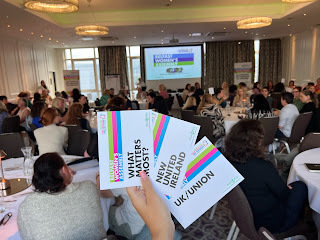 SeanadóirLynn Boylan who is Vice Chair of the Commission gave the main address. Themeeting overwhelmingly endorsed the view that the Irish government needs tobegin planning for the future and that a first step should be the establishmentof a Citizens’ Assembly on Irish reunification.
SeanadóirLynn Boylan who is Vice Chair of the Commission gave the main address. Themeeting overwhelmingly endorsed the view that the Irish government needs tobegin planning for the future and that a first step should be the establishmentof a Citizens’ Assembly on Irish reunification.
Thefollowing day in Dublin a Youth Assembly was held in the CommunicationWorkers Union. There was a real sense of purpose and excitement among the youngpeople who took part. Dermot O’Brien, a widely respected youth worker,chaired the event and the emphasis was on engagement, conversation and thefuture.
I attended the Youth Assembly and was veryimpressed with the energy the young people brought to the discussion. Thethemes of culture, music and identity were repeatedly cited as were equality,climate justice and the development of a rights based society. The biggestchallenges identified by the participants are housing, education, mental healthand education.
For some it was clearly the first time they hadtaken part in this kind of discussion and they enjoyed it. They were willing toshare ideas and thoughts about what the future could look like.
In the words of the vice chair of the Commission,Seanadóir Lynn Boylan, “Young people have been to the forefront ofmajor constitutional changes in our country, not least in Dublin. Youngpeople living in Dublin today have the chance to live in a united Ireland,something that was denied to those who came before you. You have theright, and also the responsibility, to help shape that new united Ireland andmake it a place we can all be proud to live in.'
Well Done SpecialOlympians
Team Ireland won 24 gold, 22 silver and 29 bronzemedals at the Special Olympics World Games in Berlin. The Games were a greatexperience for all the athletes who competed. They included 73 sportspeoplefrom Ireland who participated in 12 sports with outstanding successes.Well done to them all, to their supporters and families and to Special OlympicsIreland.
Eunice Kennedy Shriver – one of the USA’s famousKennedy family - and a life-long advocate for people with disability issuesfounded the Special Olympics in 1968. Her son Tim continues this workas Chairperson of the Special Olympics. An Irish woman Mary Davis is theCEO.
The last Special Olympics World Games to beheld in Ireland was 20 years ago. I remember it well. Events were held all overthe island, including Belfast and the opening in Croke Park wasa spectacular event. A proud team of West Belfast Special Olympians ledthe Féile Carnival parade that year and Robert Savage, Conor Maguire and BrianStorey opened the Féile with wonderful speeches.
I’m pleased tosay our dogs were reared in Irish.But not all dogs are so lucky. So I wasdelighted to come across a lovely little book TEACH YOUR DOG IRISH aimed at thesemutts and their humans. TEACH YOUR DOG IRISH is published by yLolfa in Walesand is written and illustrated by Anne Cakebread. It is part of a series whichincludes TEACH YOUR DOG CORNISH, TEACH YOUR CATIRISH and TEACH YOUR CATWELSH. And for those who have really clever dogs or who have nothing elseto do there is also TEACH YOUR DOG JAPANESE.
TEACH YOUR DOG IRISHis a cool wee publication with cute illustrationsand phonetic pronunciations. For example ‘Tar anseo’ pronounced ‘Tar un- shaw’and so on. That’s why it’s so clever. Because not only does your dog get tolearn Irish. You get to learn also. So why not try it: www.ylolfa.com.As renowned author Marian Keyes says: “I think this is a great idea.I love it. A charming way to help keep spoken Irish alive.”
Féile an Phobail Launches biggest Programme Ever
Well done and comhgairdheas to all of thoseinvolved in planning and participating in the launch of this year’s Féile 35 –Welcoming the World.
This year marks 35 years of this amazingfestival. The Féile organisers have done west Belfast and Belfast proud. Theyhave produced the biggest ever programme of activities and events. There willbe concerts, music, dance nights, debates, exhibitions, Sports fixtures, booklaunches, LGBTQ+ events, drama, children’s events, Women’s events, discussionson international events, art exhibitions, local tours and much more. There arealso a significant number of debates/discussions focusing on the future of theisland of Ireland and the goal of Irish Unity. The Féile will be celebratedbetween 3rd and 13th of August.
35years ago when a small group of us came together to plan a community festivalthe conditions were much different. West Belfast was heavily militarised withBritish Army and RUC barracks and forts everywhere. It was under militaryoccupation. People were censored. Community structures were subject topolitical vetting. Discrimination was rampant. There were hundredsof political prisoners. There was no state funding for Irish languageeducation. Little for Gaelic games. And state collusion withunionist death squads was rampant. The conflict was intense.
Thekillings at Gibraltar of three outstanding West Belfast citizens VolunteersMairead Farrell, Seán Savage and Dan McCann and especially the establishment'svile demonisation of their community- our community - was a tipping point. Itbecame a catalyst for a culture of change to take root.
NowFéile an Phobail is an international festival and the foremost communityfestival on the island of Ireland. This year over 100,000 people will come towest Belfast to take part in Féile and enjoy the hospitality of this community.
As wellas growing in the number and diversity of events Féile an Phobail has expandedbeyond the boundaries of west Belfast. There are now new partnerships withLisburn Féile, Féile an Tuiscirt in the north of the city and Féile na hAbhainnin south and east Belfast. For more information log on to www.feilebelfast.com
See youin August at the Féile.
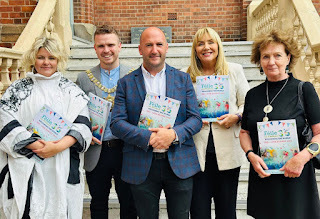
June 25, 2023
Stop the Demolition of Moore St; Coffin Ships; The Pen Behind The Wire.
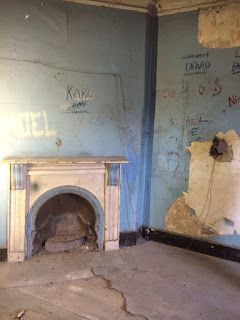 Moore St
Moore StStop the Demolition of Moore St
Thethreat of demolition to parts of the Moore St Terrace - that played a centralrole in the Easter Rising - has increased significantly. Last month theExecutive of Dublin City Council rejected a motion by Councillors that Number18 Moore St should be designated a Protected Structure. The Councillors hadpreviously passed a motion in support of this.
Ina report to Councillors the Executive concluded that 18 Moore St. is not partof the 1916 terrace. This decision stands in stark contrast to the availableevidence, including confirmation rooted in Council and governmental reports.The Executive’s report was withdrawn but will now come before the Council againin September. In the meantime Councillors have been asked to providesubmissions setting out their arguments for consideration.
TheExecutive also made it clear that it does not accept that the process ofproviding Number 18 with a protected structure status was commenced by themotion in the Council. Most worryingly the Executive states that there exists aprevious planning consent providing for Number 18 to be demolished.
Toadd to this mounting threat to Number 18 planning permissions for three sitesalong Moore St. are currently awaiting final decisions from An Bord Pleanála(ABP). The investigation by inspectors for ABP has now been completed and adecision on the sites, which includes Number 18 could be given at any time. Inaddition, the decision by Dublin City Council to add other buildings to theRecord of Protected Structures is now the focus of a judicial review by thedeveloper Hammerson.
TheSinn Féin group on Dublin City Council has made a detailed submission to theExecutive setting out the evidence that portions of Number 18 were extant atthe time of 1916. These include the Dublin City Report of this year; theShaffrey Conservation Report of 2011; the Broderick Hosford report 2014; andthe Dooley and Hall report 2019. The Sinn Féin group has called on Number 18 tobe given protected structure status.
Inthe meantime the Moore St. Preservation Trust is actively seeking legal adviceabout the options available to it.
Threeyears ago in a similar case 40 Herbert Park, the home of The O’Rahilly, the only leader of the 1916Rising to be killed in action, was demolished in a shameful act of politicaland corporate vandalism and greed. The O’Rahilly was killed in Moore St.
Despite Herbert Park being of great historical significance it wasdestroyed in a matter of hours.
Number 18 Moore St and other parts of the terrace now face a similarfate. Hammerson’s plan has the support of Micheál Martin. When he was Taoiseachhe welcomed the Hammerson proposals. Such interference in the planning processand the use of his statement in a Hammerson press release is absolutelyunacceptable.
James Connolly Heron of theMoore Street Preservation Trust said:
“Theentire terrace 10-25 Moore Street was occupied by the evacuated GPO garrison atthe end of Easter Week 1916, yet Hammerson want to demolish much of theterrace. This includes Numbers 18 and 19. Help Save the 1916 Battlefield Site.Stop the Demolition of Moore St.”
Coffin Ships
Eight years ago the death of two year old AlanKurdi brought a focus on the refugee tragedy that has turned the Mediterraneaninto a sea of death for thousands. The photograph of the child lying face downon a Turkish beach as the water washed over him was a distressing and evocativeimage.
Last week at least 78 refugees are known to havedrowned when the packed trawler they were on capsized. Survivors have said that as many as 500 more,including possibly 100 children who were in the hold of the trawler, arethought to have gone down with the ship when it sank off the southern coast ofGreece.
Since 2014 over 20,000 refugees are believed tohave died crossing what is now regarded as the most dangerous route on earthfor those fleeing war, famine and poverty.
The EU and European governments blame the peoplesmugglers who profit from packing refugees onto boats that are often incapableof making the journey. And yes, they are to blame but so too are those governments,the EU and the politicians who have collectively failed to confront the refugeecrisis in a humane and strategic fashion. Consequently, desperate people whofind the legal door to Europe barred shut to them turn to the peopletraffickers. And Europe’s response to this has been to cut back on itsrescue operations leaving thousands to their fate in the sea of death.
Fine Gael’s four MEPs voted to block aresolution in October 2019 in the EU Parliament to enhance the search andrescue operations and provide sufficient vessels and equipment. According tothe UN Refugee Agency (UNHCR) while the numbers making the journey aredeclining each year the numbers dying are steadily rising year on year. In 2019an estimated 1,510 drowned. In 2020 that figure had increased to 1,881. And in2021 3,231 deaths were recorded.
More refugees died in the first quarter of this year than inthe previous six years. The IOM documented 441 migrant deaths betweenJanuary and March. It stated that around “half of those deaths were linked todelays in state-led rescue efforts and, in one case, the absence of any rescuemission.” In a joint statement the UNHCR and the IOM called for urgent and decisive action to preventfurther deaths at sea.
The two international organisations describedthe current EU approach to the Mediterranean as unworkable. It called on the EU to ensure “greatercoordination between all Mediterranean States” including the establishment ofan agreed regional disembarkation and redistribution mechanism for people whoarrive by sea.” This places a huge responsibility on the Irish government touse its place in the EU to change the current policies of that body. Inparticular there needs to be a properly resourced rescue programme put back inplace.
Thousands of republicans were imprisoned during theconflict. They created a commendable body of prison literature, in keeping with prisonwritings from other phases in the freedom struggle.Former POWs, as well as writing their memoirs, have written short stories,novels, plays and screenplays and, of course, poetry. The writings of BobbySands, for example, have never been out of print over the past forty-two yearsand have been translated into many languages.
Eoghan 'Gino' Mac Cormaic from Derry served fifteenyears in jail and was on the blanket protest for five years at a time when tenof his comrades died on hunger strike. Eoghan began writing poems on toiletpaper and cigarette papers and smuggled them out to his family who kept themsafe from British Army raids. Some of the poems were published in RepublicanNews. Eoghan also produced cross word puzzles.
Gino is a great wordsmith. Í nGaeilgeagus í Bearla.His prison memoir - On The Blanket orAr An Pluid - is a must read tale of life in the H Blocks. Now hehas a new book of prison poetry: The Pen Behind The Wire. Prison Poems 1982- 91. Published by Greenisland Press. It will be released - pardon thepun - in August.
An interesting element of this book is that some ofthe poems are recorded and readerscan listen to the readings by using QR codes at the back of the book to accessreadings online (on a phone for example).
Some poets believe poetryneeds to be read aloud to be fully appreciated. I agree with that. So I’m delighted that Eoghanenlisted thirty six readers to give voice to his poetic musings. I includemyself in that rare audio. This columnist is honoured to read BuildingTrouble.
Other readers include Gerry Kelly, Mitchel McLoughlin, Danny Morrison,Martina Anderson, Rita Ann Higgins and Christy Moore. Eoghan’s familyalso read, including his sisterSarah McLaughlin, Alison hislong suffering wife and their four children.
There are sixty poems inThe Pen Behind The Wire. It will be launched atPrisoners Day in the Felons inBelfast during Féile An Phobail. I will give you details closer to that date. Eoghansother books are availible now at An Fhuiseoigand other outlets. Macallaí na Cillín is publishedby Coiscéim. Another fine piece ofextraordinary writing by Gino. Comhghairdeas a chara.
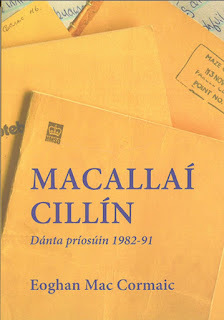
June 19, 2023
At St Comgall's, Eileen's shining vision becomes a reality: A New look at the Cinema and Unionism
At St Comgall's, Eileen's shining vision becomes areality
St. Comgall’s/Ionad Eileen Howell in Divis St. willbe formally opened next week on Thursday the 22 June. In honour and memory ofEileen the refurbished building is being named after her.
Themulti-million pound project has been 21 years in the making. The transformationof what was for many years a derelict building has been amazing. All of thosewho have contributed in any way to its successful renovation should be veryproud of their efforts.
Just over 20 years ago St. Comgall’s, which standsin the shadow of Divis Tower, had fallen into a scandalous state of disrepair.It was regularly targeted by anti-social elements and the building was a blighton the local community and environment. As the MP for west Belfast I spoketo Eileen Howell in the Falls Community Council about the possibility ofturning St. Comgall’s into a community enterprise – similar to Conway Mill –that could be a resource for the community and create sustainable jobs.
Eileen was an experienced community activistand champion for West Belfast who put her considerable energy intotackling the endemic inequalities and injustices endured by the nationalistwest Belfast community. She was irrepressible, tireless and hugely respected asa champion of the rights of citizens and of the community. She had adeep-rooted belief in the imperatives of equality and human rights, and ofeconomic and social justice. These were her guiding principles. She was awarrior for working people.
Eileen saw the enormous potential of St.Comgall’s and she and the Board of the Falls Community Council jumped at theopportunity to regenerate and develop St. Comgall’s as a community andregenerative hub.
In May 1932 Saint Comgall’s was opened as aPublic Elementary School and built to the design of R S Wilshire who was thenthe education architect in the City. Saint Kevin’s School further up the Fallsis another of his healthy schools. His designs were revolutionary for theperiod with lots of light and air.
For the next six decades thousands of SaintComgall’s children passed through its doors. The building was at the centre ofmuch of the local sporting and cultural events during those years. The manygroup photographs that exist in the enclosed courtyard are evidence of the widespreaduse of the building by the GAA, civic organisations and the localconfraternity. The front hall which has now been lovingly restored was used fordances and bingo nights.
Uniquely the building bears the scars on its frontwall of the 1969 August pogrom in which unionist gangs, led by the RoyalUlster Constabulary (RUC) and its auxiliary force the B Specials attacked theFalls and the Clonard areas of West Belfast, as well as Ardoyne in NorthBelfast. Percy St. directly facing St. Comgall’s was largely destroyed, as wasDover St a short distance away. Residents were beaten and were fired on as theytried to escape. In St. Comgall’s an IRA Volunteer fired on the mob thwartingtheir effort to destroy the school and to attack the houses on that side of DivisSt. The bullet holes on its front wall are testimony to those events.
In 2002 the Falls Community Council purchased thebuilding with the assistance of Chuck Feeney’s Atlantic Philanthropies. Thosewho signed for the building included Liz Groves; Chrissie McAuley; John Fusco;Mike Ritchie; Ruth Tallion; Jane Craven; Eilish Rooney and Joe Nolan. Some ofthose involved in the project subsequently are no longer with us. IncludingEileen. But those I remember include John Quinn; Marie Maguire; SalBrennan; Mrs Timmons; Ciaran Kearney; Ciaran Quinn; Claire Hackett; andGerry McConville. I’m bound to have left someone out. If so I will rectify thatnext week.
Eileen and her colleagues worked tirelessly seekinglong term funding, talking to architects, developing plans, talking topotential partners, and engaging with the local community. For Eileen it wasthe perfect flagship gateway project into west Belfast.
Sadly two years later, in 2004 Eileen became veryill. She died on 12 June 2004 – her anniversary was on Monday. Her loss waskeenly felt by her family, by her husband Ted, her two sons Eamonn andProinsias and the wider family circle. Her death also robbed the west Belfastcommunity of a skilled and inspirational leader.
In the years since then the Falls Community Councilhas worked hard to make Eileen’s vision for St. Comgall’s a reality. Shewould be very proud of the St. Comgall’s building that has now emerged phoenixlike out of the ashes of the abandoned and derelict building.
St. Comgall’s/Ionad Eileen Howell is designed topromote economic, educational, social and cultural benefits for the people wholive and work in the local area and to promote good relations betweencommunities through the provision of a multi-use community hub. It is a stunningbuilding. If you want to see what it once looked like and what it looks likenow then follow this link https://www.belfastcity.gov.uk/stcomgalls
You will be amazed.
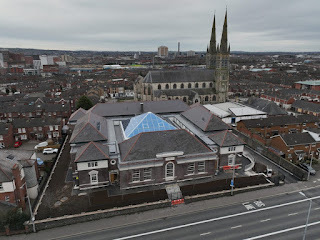
A New look at the Cinema and Unionism
Richard Gallagher’s ‘Screening Ulster: Cinema andthe Unionists’ is more than its title suggests. The book specifically focuseson the period from the 1980s. From the first page Gallagher sets hisexamination of how unionism has been portrayed in the cinema over the last 40years.
In his insightful and extensively researched bookGallagher’s perceptive analysis of political and cultural unionism, its senseof Britishness, of loyalism, of community concludes that this complexity islargely absent in the cinema portrayal. What we see on the screen is a “muchnarrower definition of the unionist identity that rarely escapes a polarisedrelationship with Irish nationalism.” Gallagher finds that “themany complications and contradictions within both the unionist identity andunionist perspectives of the Troubles” have been largely ignored.
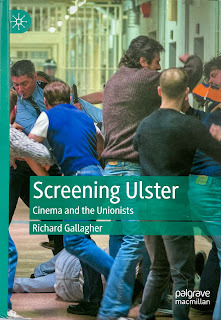 Where unionism is portrayed it has been primarilythrough “associations to Orangeism (parades, loyalist bands andbonfires)” and through sectarian violence. Orangeism and itstraditions are often presented as supremacist, sexist, intolerant anduncompromising. According to Gallagher the most dominant form of culturalexpression espoused by unionism is to be found in the loyalist bands thataccompany the orange parades.
Where unionism is portrayed it has been primarilythrough “associations to Orangeism (parades, loyalist bands andbonfires)” and through sectarian violence. Orangeism and itstraditions are often presented as supremacist, sexist, intolerant anduncompromising. According to Gallagher the most dominant form of culturalexpression espoused by unionism is to be found in the loyalist bands thataccompany the orange parades.
In addition, Gallagher asserts that the depictionof loyalist paramilitaries has increasingly dominated cinematic depictions ofunionists. This has been influenced by the actions of unionist death squadslike the Shankill Butchers. Consequently, in the cinema loyalists are oftenpresented as “monstrous and indiscriminate in their use of violence.” Theyare rarely ascribed with being politically motivated.
Gallagher believes that the crisis in unionism’sidentity has its roots in partition. He quotes unionist commentator Alex Kanesaying; “Because we lost the union between Britain and Ireland, becausewe were contained to six counties and a majority that we knew would not bestabilised at 30%, and because we thought things would grow against us, unionismbecame paranoid. It became insular and afraid of everyone.” It was inreality the outworking of the British colonial experience in Ireland.
Gallagher also references the tensions that existwithin unionism because of its contradictory and at times antagonisticrelationship with the British state. Its loyalism to Britain has always beenconditional. Unionist paramilitaries and political parties have a long historyof links to the British military, its intelligence services and in particularthe Conservative party. Collusion between unionist death squads and the Britishstate has long been a matter of British policy. However, that loyalty hasrarely been reciprocated by the British state.
A recent example of the dysfunctional relationshipbetween unionists and British governments, and especially the Tories, is thefrequency with which unionism has been abandoned, commitments given to itdiscarded and unionist parties often and very publicly thrown under the bus.
Boris Johnson’s resignation last week as an MP is areminder of one British Prime Minister who was wined and dined by the DUP andwho made promises, which he then broke. Remember his triumphant visit to theDUP’s party conference in 2018? Arlene Foster was delighted. Johnson wastalking their language. A hard Brexit and a hard border. But then the DUP wereditched and the hated protocol was produced.
Another example of a British Prime Minister dumpingunionism when it was no longer needed. If you have an interest in cinema, howit has dealt with unionism and what all of this means for unionist identitythen this is the book for you.
Screening Ulster: Cinema and the Unionists by Dr.Richard Gallagher is published by Palgrave MacMillan: https://link.springer.com/book/10.1007/978-3-031-23436-1
June 12, 2023
On your Bike: Onus on Irish government to protect GFA: Historic result in the Basque country
ON YOUR BIKE.
I have givenmy good bike away. This marks a defining moment in my life. My good bike sat inthe backyard for almost a year. That’s the lasttime I was out on it. A year ago. It was dawning on me that my cyclingdays were over except for occasional sorties on a Greenway in some secludedplace. But I was reluctant to face up to that. It seemed to me that aslong as I held on to my good bike I held on to the possibility of venturingforth on it. Once it was gone that possibility was gone also. So Ihung on. And on. And on.
Then it struck me that someoneelse could be getting pleasure from my good bike. So thisweek I gave it to Anrai Óg, a fine cyclist, on condition thathe is kind to it and that he wears a helmet. I got my good bike in Dundalkabout fifteen years ago. It was great for scooting about Dublin when I was aTD. Richard would be stuck in traffic as I whizzed passed him. It was dangerouscycling in Baile Atha Cliath. Some motorists are oblivious to cyclists. But Isurvived. And I enjoyed the freedom that a bike represents.
Then I brought it back toBelfast. Here some motorists are equally oblivious to cyclists. But some werenot so oblivious to me. Irate anti-Shinner wannabe death drivers tried to run me off the road a few times. Others used to shout abuse asthey drove slowly alongside me. Dirty Fenian invective isthe ruination of a good spin on a bike. The Sinn Féin traffic police had aword with me so I limited my outings. Then I hurt my back and the bike was grounded.
Like most activities itshard to get started again once you’ve stopped. But now I thinkI’vedone the right thing. At least the good bike is getting a bit ofexercise. But I miss it.
I have been cycling since Iwas a wee buck. Joe Magee and I used to make our own bikes with salvagedframes, refurbished brakes and wobbley wheels. We got very goodat repairing and riding our makey up steeds. We used to wander out to Glenavyand Lough Neagh on Sundays. Onec I careered down Hannahstown Hill when it was astraight run down to Suffolk Road. My brakes failed and I screamed across theGlen Road at high speed. Luckily there were no cars to impede my passage.
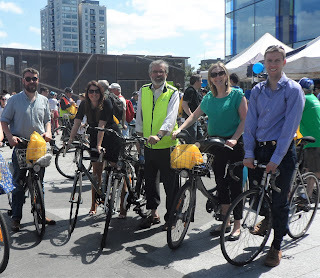 Iremember when I got my first wages I bought a new racing bike onhire purchase. From a shop on the Shankill Road. I also remembercrashing it into the back of a bus on the Springfield Road just below the WestCircular. The kindly conductor took me and my injured cycle on the platform ofthe bus and dropped us off in the city centre close to The Duke of York, myworkplace. A new front wheel from Garvey’s and I was able to cycle back homeagain that night. Some years later I dodged Brit Army road blocksand slipped around Belfast on two wheels.
Iremember when I got my first wages I bought a new racing bike onhire purchase. From a shop on the Shankill Road. I also remembercrashing it into the back of a bus on the Springfield Road just below the WestCircular. The kindly conductor took me and my injured cycle on the platform ofthe bus and dropped us off in the city centre close to The Duke of York, myworkplace. A new front wheel from Garvey’s and I was able to cycle back homeagain that night. Some years later I dodged Brit Army road blocksand slipped around Belfast on two wheels.
So you dearreader can see how I miss my good bike. Over the years I have cometo understand what Flann O Brien meant when he wrote in TheThird Policeman that people can take on the personality of theirbike.
‘ The gross and net result of it is that people whospent most of their natural lives riding iron bicycles over the rockyroadsteads of this parish get their personalities mixed up with thepersonalities of their bicycle as a result of the interchanging of the atoms ofeach of them and you would be surprised at the number of people in these partswho are nearly half people and half bicycles...when a man let’s things go sofar that he is more than half a bicycle ………. ‘
So there youare. I’m not half the man or half thebicycle I used to be. But at least my good bike is happy.
Onus on Irish government to protect GFA
Human rights abuses and inequality were at the coreof the Unionist Stormont Regime. Discrimination in employment and housing, thegerrymandering of electoral boundaries under the Unionist One Party state, wereembedded in the DNA of Britain’s colonial outpost in Ireland.
Consequently, when the Good Friday Agreement cameto be negotiated the issues of equality and human rights were central to its provisions.Under these there was to be a Bill of Rights and the European Convention onHuman Rights (ECHR) was to be incorporated into the law of the North. However,25 years later there is still no Bill of Rights and the British Tory governmenthas repeatedly said that it intends to get rid of the Human Rights Act whichreflects many of the rights provisions made in the GFA.
The adverse impact of Britain’s refusal to honourits human rights commitments has been underlined in three recent significantreports coming out of Europe.
A report by the Parliamentary Assembly of theCouncil of Europe (PACE) confirms that since Brexit, the rights ofindividuals in the north have been undermined. The PACE Report states: “Brexithas already led to a diminution of the rights of Irish and EU citizens in NIand threatens to do so to an even greater extent in the future."
The European Economic and Social Committee (EESC) report - TheImplementation of the EU-UK Withdrawal Agreement- was published in January. Itfound that the British government has failed to live up to its commitment “tocontinue to facilitate the work of the human rights and equality commissionsestablished under the GFA”.
It concluded that the British government has “acted incompatibly withthis commitment, in particular in running down the NI Human Rights Commissionto such an extent that the UN accreditation committee has declined to renew its"UN A Status."
The third report is by the International Juristsdelegation which came to Ireland February It represents international humanrights lawyers from Europe, the USA and South Africa. The wide ranging report -“The Crisis in the Human Rights Framework of the Good Friday Agreement” -specifically examined Britain’s proposed Legacy legislation, changes to theHuman Rights Act and the impact of Brexit.
The conclusions make for damning reading of theBritish position. The report concludes that: “The UK Government will violateinternational law if it passes the Legacy Bill”. The delegation called on theBritish government to end its “legal and political attacks on the Good FridayAgreement.” Their report asserts that the British government “is not acting ingood faith or fulfilling its role as an honest broker in maintaining the terms”of the GFA. The report calls for the Legacy Bill to be withdrawn and that theHuman Rights Act should be strengthened, not weakened.
The Human Rights protections that are an integralpart of the Good Friday Agreement are under sustained attack from the Tories. Avigorous defence in required but specifically there is a heavy onus on theIrish government as the co-equal guarantor of the Good Friday Agreement toemploy its diplomatic and political resources to challenge this Britishstrategy.
Historic result in the Basque country
As Irish republicans enjoy the recent success inthe local government election in the North our friends and comrades in theBasque country – EH Bildu – were also enjoying a significant historicalelectoral victory.
The election was for 12 regional governments and8,000 municipal councils. The result was bad for the governing Socialist Partyand good for the opposition conservative Peoples’ Party and puts it in pollposition for the general election which has been brought forward to July.
However, in the Basque country the pro-independenceparty EH Bildu made a significant breakthrough in the Parliament of Nafarroaand the county parliaments of the Basque autonomous region provinces of Araba,Bizkaia and Gipuzkoa.
Arnaldo Otegi, afrequent visitor to Ireland told a press conference: “We are committed toleading the change that people demand, and we are open to building alliancesfor the benefit of the majority.”
In the weeks aheadnegotiations will intensify to form provincial governments. EH Bildu is wellplaced to make gains.
So, well done to Arnaldoand Urko and all of our friends in the Basque country.
June 7, 2023
Remembering Fr. Matt Wallace – He never stopped giving
Remembering Fr. MattWallace – He never stopped giving
Today marks the tenth anniversary of the death ofFather Matt Wallace. Fr. Matt was from Templetown in Co Wexford. He wasordained in 1970 and spent most of his life as a priest working in West Belfast.At the time of his death Matt was parish priest of Holy Trinity whichcovered the Turf Lodge area. His funeral was attended by four bishops, over 40priests and colleagues and by over a thousand mourners.
His family travelled up from Wexford to be present.This is a column I wrote at that time about the Wexford priest who won thehearts of the people of west Belfast.
FATHER MATT
I slipped up the side of Holy Trinity church and joined the people standing atthe front door. Matt's clann were standing across from us in a line talkingquietly. I noticed how well the church grounds looked. The crowd at the gatethickened. More people joined us. Turf Lodge was hushed. The sun shone. Thebirds sang. It all seemed surreal. Normal.
Then the coffin was lifted from the hearse andcarried into the porch of the church. People started to applaud. Matt was home. Home in Holy Trinity.
His family wept. So did the rest of us. Poor Matt.Such a good straight decent man. Struggling. Giving. Slagging. Praying. Butnever preaching. Funny that. A priest who didn't preach. Not in theconventional sense.
'People here don't need me to tell them what iswrong and what is right. They are rearing families, minding neighbours. Theyknow what is wrong and what is right. The people are the church. It was alwaysso. They need support. Hope. A chance. Not long sermons'.
So Matt didn't preach. Matt led.
He was conscious of all the flaws in the humancondition but energetically and impatiently alert to our great potential andour possibilities. His vocation was grounded in that gospel of hope. For all ofus.
His Masses were always packed. And quick. He didn'thang about. Bustling up onto the altar. If he said anything aside from theprayers it would be to commend some local project or to comment favourably on alocal development or disapprovingly of something the powers that be had done.Or to joke with someone in the congregation.
Matt saw the Mass as a social occasion. He told methat. For many people, he said, it was where they meet their friends.Particularly older people who didn't get out a lot. If you go to Holy Trinity afew minutes early for Mass that's what you would notice. People sittingchatting to each other. Others kneeling and praying of course. But in thebackground the low chatter of folks talking. Then, in Matt would come and allwould rise. And he would be off at a gallop.
Matt is from Wexford. The weekend his life ended Wexfordbeat Louth in the football, and drew with Dublin in the hurling. He would haveliked that. Forty years in Belfast, first on the Ormeau Road and the rest ofthe time in West Belfast, in Divis and Lenadoon and Turf Lodge. But a proudWexford Gael.
Working with the great people of this wonderfulcommunity through all our tribulations. Baptising our babies. Burying our dead.Officiating at our weddings and communions and confirmations. Working atbuilding schools and community centres and youth facilities and counsellingservices and women's projects. Fundraising. Encouraging jobs initiatives.Visiting the sick. And the dying. And the elderly. Looking after victims ofabuse of every kind. Challenging the system. Standing up to the BritishArmy when they were here. Visiting the prisons.
And having the odd pint up in the Gort to celebratethat fine club's achievements and to discuss the merits of Wexford and Antrimhurling.
Matt was his own man. He was often annoyed at theHierarchy. At the height of the revelations of clerical child abuse and afterthe publication of one of the reports into this he told usone Sunday morning that he had a letter from the bishops to read tous.
'But' hecontinued, 'if you are really interested in what bishops are saying youcan read it for yourselves. We all know what the bishops should do. They shouldclear all this up. And if they are not prepared to do this then they shouldresign.'
And he continued with the Mass.
Matt was a very human being.
Another time when one of our much loved oldpatriots and celebrated Gaels, Eddie Keenan, died his local priest would notlet Eddie's coffin into the parish church draped in the national flag. Hisfamily contacted me. I phoned Matt.
'Bring him here Gerry", hesaid.
And we did. For a Mass of music and song. A celebrationof a life well lived.
Much like Matt's life. He also lived his life well.
He gave his all. And never stopped giving.
Calls to the house at all times of the night.Distressed citizens. Or Passport forms to be signed. References to be written.Attending the scenes of sudden deaths. Of suicides. No wonder he smoked like atrain. When he wasn't trying to give them up. Always something else to do.Someone else to attend to. Matt gave and gave and gave. Until he had nothingelse to give.
And we, who wonder why he went as he did, we whoare hurting because we couldn't help him, we who are honoured to call himFather and friend we know we are better people because of him.
Because he loved us and cared for us. All of us.
The killing of Eddie Fullerton: Nakba – the expulsion of the Palestinians
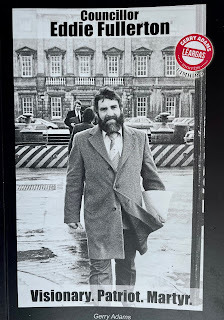
The killing of Eddie Fullerton
In March 1984 I was shot as I andfour friends drove from Belfast Court. We were driving up May St. at the backof the City Hall when our car was fired on from a passing vehicle. Four of us –myself, Sean Keenan, Joe Keenan, and Kevin Rooney - were hit. Bob Murray escapedinjury. I was wounded in the neck, shoulder and upper body. We were blessed by incompetentassassins, UDA members and surrogates of the British system.
Shortly after this Colette and Itravelled to Donegal for me to recuperate. Friends of Martin McGuinness, whohad a mobile home not far from Buncrana in the Inis Eoghain peninsula, verykindly gave us the use of it. A local republican, not long out of prison inEngland, the late Réamonn Mac Lochlainn and his wife Mary – parents of PádraigMacLochlainn TD - made sure we were not lacking in any home comforts.
Among those who were frequentvisitors was local Councillor Eddie Fullerton and his friend Jim Farry. Theylooked after us. Their craic was mighty. Eddie took great pleasure in bringingme about Inis Eoghain. He told me the history of this very beautiful part ofthe world.
Eddie brought me to the littlequay, close to Crana Bridge, where the Crana River meets Lough Swilly. It washere that Wolfe Tone landed after his capture on Lough Swilly by the Britishforces in 1798. Known locally as the ‘stone jug’ a memorial to Eddie now standsalongside the Wolfe Tone memorial stone on that historic spot.
Eddie was assassinated at his homein Buncrana by the UDA in May 1991. He was one of three Sinn Féin Councillors,Leas Uachtarán Máire Drumm, 17 party members and four family members who werethe victim of British state collusion during the years of conflict.
Last week on the 32nd anniversaryof his murder I joined his family in the Lake of Shadows Hotel, Buncrana forthe launch of my latest Léargas book - ‘Councillor Eddie Fullerton:Visionary. Patriot. Martyr.’ It tells the remarkable story of Eddie from hisbirth in 1935, through his formative years in Inis Eoghain, his journey toScotland and England, his marriage in Birmingham to Dinah and his return toDonegal. My thanks to Richard McAuley for his assistance with research andDanny Morisson for proof reading.
The book recountsEddie’s activism as a Sinn Féin Councillor. It also provides detail – drawnfrom the family and from the Police Ombudsman’s Operation Medina and OperationGreenwich reports, on the extent of British state collusion in his murder andthe failure of the Irish government to challenge the British government’scover-up of this.
Eddie was a larger than lifecharacter with a big mop of hair, a thick beard and a voice to match. He andDinah had six children; Johnny, Marina, Albert, Amanda, Anita and Eddie. SadlyAlbert was killed in a road traffic accident in 2006.
With Dinah - Eddie's wife
Eddie was also a frequentcontributor at our annual Ard Fheis and other party conferences. He was anaturally gifted and inspirational speaker who marshalled his argumentslogically and presented them passionately. When speaking at the Ard Fheis hewould always run over the allotted time. On one occasion I remember the sessionChair Seán McManus vainly attempting to call Eddie’s contribution to a halt.
“You are overtime speaker andthere are other contributors waiting to speak. Will you please wrap yourremarks up!”
He tried to interrupt Eddie againand again and again. Eddie didn’t flinch. He kept right on going.
Finally after another very sternwarning from the Chair Eddie turned to him and said with a big grin:
“Look, I have had to travel onehundred and sixty three miles to get here. And that’s not counting theroundabouts! So I’m gonna speak and I’m going to finish.” And he did.That was Eddie.
Amanda Fullerton agus mise talking to the audience
On one infamous occasion theprejudice of the southern political establishment saw an Irish governmentMinister refuse to meet a Council delegation because Eddie was part of it.Rather than see his colleagues miss the opportunity to speak to the MinisterEddie withdrew from the meeting.
For years Eddie campaigned to havea dam built to supply water to Buncrana and local businesses. Eventually hesucceeded. It was constructed in Pollen Valley outside the town. It took twelveyears to complete. It was named after Eddie. Years later Martin McGuinnesswrote a poem about it.
This Léargas is a celebration ofthe life of Eddie Fullerton - his activism, his republicanism and his family.It also tells the story of collusion and of the background to his murder.
I would urge all of you to supportEddie’s family in their efforts to force the Irish government to stand up fortheir right to truth and to challenge the British government’s efforts toprevent this, especially through the current Legacy Bill.
This is the ninth publication inGerry Adams Léargas series and a tenth will be published in June celebratingthe activism of Fra McCann and Alex Maskey. In August a Léargas about RitaO’Hare will also be published.
‘Councillor Eddie Fullerton:Visionary. Patriot. Martyr.’ is available from The Sinn Féin bookshop, 58Parnell Square, Dublin 1 – www.sinnfeinbookshop.com and from AnFhuiseog 55 Falls Road BT12 4PD and www.thelarkstore.ie
Fullerton’s Dam
by Martin McGuinness
Purple-heathered hillsides clothe the peaty bogsleaching streams of water swimming pools for frogs.
Down along the glenside a richbrown vein does run to meet and greet another beneath the rising sun.
Here below twin bridges theCrana springs to life amid kamikaze midges where father found his wife.
At castle gates salmon waitsout in the Swilly blue for destiny and a leaper’s spate to bring her home sotrue.
A creator with an earthy facedecreed his plan would make this valley the perfect place to gather raindropsin a lake.
Nakba – the expulsion of the Palestinians
May marked the75th anniversary of the Nakba or Catastrophe – the forcible expulsionof three quarters of a million Palestinians from their homes by Israeli forcesin 1948. On 15 May 1948 the Israeli state was formally recognised by the UnitedNations. The expulsion of Palestinians which had been going on was stepped up.750,000 Palestinian people were dispossessed and forced to become refugees intheir own land. Israel ethnically cleansed over 500 villages and killed 15,000Palestinians.
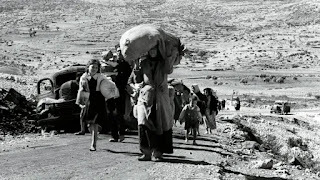 Today Palestinians are subject tothe apartheid regime that is Israel. More than three million livein the occupied West Bank and East Jerusalem and are subject to ongoing arrest,internment, daily attack and murder, the theft of land and water resources andthe destruction of homes and schools.
Today Palestinians are subject tothe apartheid regime that is Israel. More than three million livein the occupied West Bank and East Jerusalem and are subject to ongoing arrest,internment, daily attack and murder, the theft of land and water resources andthe destruction of homes and schools.
Two million Palestinians live inthe Gaza Strip under an Israeli siege. And almost two million more Palestinianslive in Israel where they are subject to extensive discrimination by a systemof structured political and economic discrimination.
As a result ofIsraeli policy there are almost eight million Palestinian refugees.
In solidarity withthe Palestinian people Sinn Fein TD John Brady recently introduced legislationin the Oireachtas calling on the Irish government to instruct the IrishStrategic Investment Fund to divest itself of all current assets belonging tocompanies operating within illegal Israeli settlements that are in breach ofinternational law.
However, while the Irish governmentclaims to support the Bill it has chosen to block the legislation fromprogressing by attacking the UN Human Rights Council Database on which the billis premised. As a result the Irish state remains financially connected to theactions of Israel within the illegal settlements.
Its attitude on this is similarto its approach to the motion passed by Oireachtas in December 2014 that called on the government to ‘officiallyrecognise the State of Palestine, on the basis of the 1967 borders with EastJerusalem as the capital, as established in UN resolutions, as a furtherpositive contribution to securing a negotiated two-state solution to theIsraeli-Palestinian conflict.”
The motion was passed butthe Irish government has done nothing to advance it. Shame on it. If you want to knowmore about the Nakba watch this video: https://www.youtube.com/watch?v=0IFsj6Y3xfsMay 29, 2023
Ar Slí An Fhirinne: Delivering Change: In solidarity with LGBTQ+ citizens: Poems for Hard Times - Child’s Play.
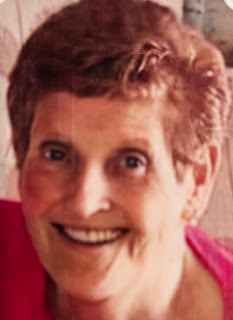 Martha Mallon
Martha Mallon
Ar Slí An Fhirinne.
It’s the age we’re at Itell myself and my declining peer group as we attend funeral after funeral thislast wee while. The great wheel of life is now turning for ourgeneration. This phase started with Colette’s sister Martha. Martha was eightyfive. The matriarch of the Ma
llon family. A kind, strong, gentle woman wholived on through Parkinson’s and the loss of her husband Jim and their son Jim.Martha was ferried between Andytown and Donegal and Spain by her devoted familyuntil her time came. Mary Herald, the same age as Martha and a childhood friendand neighbour in the Whiterock went next. A valiant Camóg in her day and alifelong Antrim Gael.Then out of the blue ourfriend and comrade Damien Gibney died quietly and unexpectedly dozing in hischair. Damien, one of the two first Sinn Féin Councillors elected to Lisburn,along with Pat Rice, in dangerous times will be deeply missed by May and Sineádand the entire Gibney clann. Andrea Murphy’s tribute last week speaks to the history,kindness and compassion of that family.
On Sunday on the road backfrom an event in Dungannon we got the news that Rab Kerr had died suddenly. Laurence McKeown who was 73 days on Hunger Strike in 1981 remembered Raband Jennifer McCann.
“33 years ago today, the17th May 1990 I was best man at the wedding of Rab Kerr and Jennifer McCann.The wedding took place in the chapel of the H-Blocks, Long Kesh where Rab and Iwere both life-sentence prisoners. Jennifer too was a prisoner at the time inMaghaberry Prison (and before that Armagh Women's Prison) where she was servinga 20-year sentence. Her bridesmaid was Mary McArdle, also a life-sentenceprisoner. They were both brought from Maghaberry to the H-Blocks for thewedding and then returned to Maghaberry that afternoon.
Jennifer, aged 21 at thetime of her arrest, was sentenced on the 6th March 1981. She was a close friendof Bobby Sands and Bobby wrote in his prison diary while on hunger strike thatday, "My friend Jennifer got twenty years. I am greatlydistressed."
After the wedding ceremonyJennifer and Mary were held in the prison hospital over lunchtime beforegetting visits with Rab and me. They both often talk about how strange andemotional it was to be in the place where Bobby and the other 9 died.
Last Sunday afternoon I gotthe tragic news that Rab had died suddenly. Rab, a volunteer, a blanketman, anescapee (1983) but most of all a gentleman, loving husband of Jennifer, anddevoted father to Meadhbh, Sáerlaith and Fionntan.
Slán a chara”.
Laurence speaks for all ofus who knew Rab. Go raibh maith agat chara.
Pat Donaghy from Tyrone, afriend of mine and a long time Sinn Féin supporter in the USA and a champion ofthe search for peace in his homeland lost his brother Gerald around the sametime. Gerald, like all the Donaghy clann, was a good Irish patriot. He hosted anumber of Friends of Sinn Féin events for me to speak at. The family organisedfor him to be buried in Carrickmore. He was to be waked in the family home inTromogue. His older brother Jim made all the arrangements. Then Jim diedsuddenly. We buried the two brothers together on a beautiful May morning lastweek in their beloved Tyrone.
Kieran Monaghan
On the way back to BelfastI got the news of the death of Kieran Monaghan, Máire’s husband, Daddy of Harryand Gabrielle and son of Ciaran and Gabrielle. Kieran had been valiantlybattling cancer.
For months he defied deathand astonished family, friends and his medical team by his calm, stoicalrefusal to give up. Eventually Kieran left on his own terms on his DivisMountain utopia surrounded by his clann and close to nature and his dogs.
Too many funerals in tooshort a time. Yet this is life. In these times of loss and grief the blessingsof an Irish wake are clear. So too is the kindness and generosity of localcommunities. That was a character of all the funerals I attended. Its what wedo well. There is comfort too in religious rituals, in music andstory-telling.
No one, even people ofgreat faith, knows what happens to us after we die. That’s one of life’s greatmysteries. In the Irish language we describe the dead as being on the way oftruth - ar slí an fhirinne. They now know what comes next. The ancientIrish believed that the spirits of the dead linger in places that they loved. Ilike the sense of that. So Kieran's spirit will forever roam themountain.
We also know thatfriends and family members continue to be our friends and family membersafter they die. Death does not change that.
Death does notstop brothers being brothers. And mammies and grannies are mammies and granniesforever. Granda's too. And daddies. They all live on in ourmemories. The Donaghy's and Damien, big Rab and Martha and the others willcontinue to mind their families. Forever.
Cleaky told me decades agothat immortality is to be remembered and spoken of, by friends and family. Solet us speak of all them. With love and affection.
Paul Maskey MP with five SF Councillors elected for the Colin area
Delivering Change
Last week’s northern localgovernment election was an outstanding success for Sinn Féin. Well done toeveryone involved, especially the voters.
The Sinn Féin leadership,its local election directorates and activists, including many from the Southpresented the electorate with sound policies and a powerful team of experiencedand first time candidates to vote for. The party stood on its commitment toIrish Unity, our record of work in the Councils, our defence of the Good FridayAgreement and on the imperative of getting the power sharing institutions backup and running. Michelle O’Neill demonstrated her commitment to be a FirstMinister for all.
As a result there are now144 Sinn Féin Councillors.
Sinn Féin is the largestparty in the Assembly; the biggest party in local government by seats held andvote share; has the greater number of MPs at Westminster and is the largestparty in the South. In addition the number of voters who backed parties thatfavour a United Ireland is greater than those who backed the union withBritain.
But we still have to securethe unity referendum promised in the GFA and to win it. That means increasingour efforts to persuade the Irish government to establish a Citizen’s Assemblyand to begin the process of planning for Irish Unity.
Citizens want us to deliveron commitments. They want the promise of change and the hope for a new futureto be more than rhetorical. We need to keep building greater politicalstrength. The momentum is with those who want change but the bigchallenge facing Irish republicans is how we use our growing strength, notleast to secure and win the Good Friday Agreements unity referendum.
In solidarity with LGBTQ+citizens
Last week a video wasposted on social media of a vicious attack on a young person in Navan in Co.Meath. It shows a 14-year-old boy being violently assaulted by a group of otheryoung people. The boy is punched to the face and forced to the ground where heis kicked and punched again as he tries to crawl away. The assault only endswhen other young people step in to stop it.
The 14-year-oldsuffered concussion, broken teeth, and extensive bruising, including the markof a shoe imprinted on his forehead.
According to the youngperson’s family he was targeted because he is gay. He is the victim of ahomophobic hate crime. In the aftermath five young people were arrested andthere is an ongoing Garda investigation. At the weekend people marched throughNavan in solidarity with the young person.
I want to extend mysolidarity to the victim. There can be no place for such hatred in any society.Bullying and hate crime whether against the LGBTQ+ community or whether it isgender based or sectarian or motivated by race or colour must be confrontedwherever it rears its ugly head.
Poems for Hard Times
Child’s Play.
A little girl
A wee boy
Brother and sister
Wind in their hair
Rain on their faces.
Unbridled energy
Unfettered exuberance
Excitement released
Like an escaping captive
Intoxicated by fresh air.
Darting, jumping
Leaping yelling
Running falling
Squealing screaming
Laughing crying.
Uplifted by nature
And their own hyperness
At one with the elements
And with themselves
Dancing in the nowness.
And the sheer and simple
Joy of being.
Gerry Adams's Blog
- Gerry Adams's profile
- 29 followers


